|
|

The Skating Pond
Lambton County, Ontario
1992
Larry Towell The World from My Front Porch
Photographs by Larry Towell
1 2
Eye of the Storm
The quiet force of photographer Larry
by Daniel Baird
photos by Larry Towell
walrus _______________________
from
Rosebery
Mick Imlah
(....)
These were the means by which he kept warm
his authority, even when he was ailing.
At the hour of Armistice, which came, alas,
after his stroke – that rendered him speechless
into the autumn – and failed to inspire him,
the whole host of Edinburgh gathered outside
his town house there, while he was propped upstairs
just semi-conscious, – shouting out his name
like a football chant, Rozbury, Rozbury,
as if he’d scored twice on their piece of field.
And I suppose we will cheer for anything
that lets us own a bit of its victory,
even if it is stricken or so struck
it can’t get to the window to wave back
or utter a word to clinch the occasion.
So whether, indeed, his powers of recovery
“confounded his physicians”, or with the loss
of finer faculties, as one reported,
he’d “hardened into dogma”, either seemed
to me a daunting prospect: he took on
the character of the headstrong general,
let down, scathing of both sides – but showing
his utmost in the fog and shame of retreat.
...(more)
Mick Imlah (1956-2009
The Lost Leader
Mick Imlah
amazon link
In praise of a proper Charlie
Kate Kellaway on Mick Imlah
If the poetry he wrote differed from the work he published, this is not least because he was able to retain his own voice even while exposed to the baying of other poets, who would submit offerings so abundantly.
Still, the manner in which he edited had something of the poet's technique, and here, too, he would respond to inspiration and instinct as much as he would to the in-tray; he continued his work through the last phases of his illness.
He faced his own death bravely, and it is a comfort to many that he could enjoy the late acclaim his last book has brought him – he was able to attend the Forward Prize party at which The Lost Leader was named the best collection of 2008. The book is all the more remarkable for being so free of the circumstances under which it appeared. ...(more)
Extending The Tradition [pdf]
John Burnside on Imlah's The Lost Leader
This sense of identity with the past is as much a defining characteristic of The Lost Leader as Imlah’s sly wit and wide-ranging intelligence, and it is the tension between the two – between elegy and classical detachment – that makes this an outstanding collection. It is also a highly ambitious book in any number of ways: in its exploration of the complex loyalties and conflicts of the Scottish Diaspora, in its profound and occasionally subversive dialogue with such poetic ancestors as Gray, Tennyson and Henryson, in its reworkings of myth and history, in its technical brilliance – and in considering a book so very much haunted by the ghost of Tennyson, we should remember Eliot’s remarks on that poet’s technical gifts: “In ending we must go back to the beginning and remember that In Memoriam would not be a great poem, or Tennyson a great poet, without the technical accomplishment. Tennyson is the great master of metric as well as of melancholia; I do not think any poet in English has ever had a finer ear for vowel sound, as well as a subtler feeling for some moods of anguish.”...(more [pdf])
_______________________

J.E. Welsh
Bybee, Ky
Doris Ulmann Photograph Collection
University of Oregon Libraries Digital Collections
_______________________
We Who Are Left Behind:
Poetry as Testimony in Derrida and Celan
Matthew Landis
To write is to arrange language under fascination and, through language, in language, remain in contact with the absolute milieu, where the thing becomes an image again, where the image, which had been allusion to a figure, becomes an illusion to what is without figure, and having been a form sketched on absence, becomes the unformed presence of that absence, the opaque and empty opening on what is when there is no more world, when there is no world yet.
~
Maurice Blanchot, “The Essential Solitude”
Poetry has a few distinct features that make it fertile ground for interrogating writing and the layers of hidden meaning, collective wishes, and unspoken associations which saturate it . Rather than a concern for grammar and syntax, it provides it’s own unique ideas about form. The sonnet, the ode, the villanelle, aleatoric writing, oulipian constraint, conceptual poetry, Projective verse --the language of any poem is replete with supplemantarity, departures, presuppositions and cognitive and aesthetic fissures and fissions. The devices associated with these formal paradigms, when deployed in a poem, can refer to several layers of meaning and association, the literal image or supra-textual ideogram, a narrative line or a paratactic break. And despite the variations on form and the diversity of content, any of these devices do not lessen a poems discursive or communicative qualities (no matter how they might be re-worked, masked, or undermined). Even an attempt to obfuscate meaning and to challenge notions of legibility communicate something about our understanding of language and signification. Even a blank sheet of paper folded into a bottle carries a message....(more)
An excellent estended piece - highly recommended - mw
_______________________
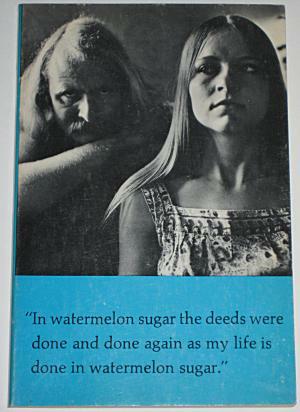
Richard Brautigan
January 30, 1935 - October ?, 1984
All Watched Over by Machines of Loving Grace
Richard Brautigan
I like to think (and
the sooner the better!)
of a cybernetic meadow
where mammels and computers
live together in mutually
programming harmony
like pure water
touching clear sky.
I like to think
(right now, please!)
of a cybernetic forest
filled with pines and electronics
where deer stroll peacefully
past computers
as if they were flowers
with spinning blossoms.
I like to think
(it has to be!)
of a cybernetic ecology
where we are free of our labors
and joined back to nature,
returned to our mammal
brothers and sisters,
and all watched over
by machines of loving grace.
Brautigan at PoemHunter
Levi Asher on Richard Brautigan
Literary Kicks
Richard Brautigan: Essays on the Writings and Life
edited by John F. Barber
google books
A Confederate General from Big Sur, Dreaming of Babylon, and The Hawkline Monster:
Three Books in the Manner of Their Original Editions
Richard Brautigan
google books
Richard Brautigan at the Beat Page
_______________________

PlmsTube for Situationist Videos
youtube channel
The Program on Law and Mind Sciences at Harvard Law School
"The Human Animal, Ideology, the Law & Other Situational Characters"
Jon Hanson
_______________________
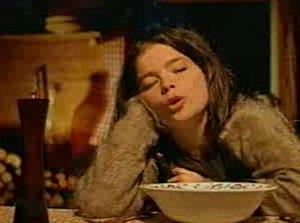
Human Behavior
Björk
youtube
_______________________
Interview: Charlotte Mandell
Maitresse
M: How do you get interested in translating a particular work?
CM: The writing. If the writing is interesting, I’ll do it – I don’t care about plot or character development. That’s why so many different genres appeal to me: philosophy, poetry, fiction, musicology – so long as it’s well-written, I’m in....(more)
_______________________
Deep in the Archive
by Ulrich Baer
Aperture, Issue No. 193 (Winter 2008)
Reviewed at Reading Archives
Why did Ulrich Baer, a comparative literature professor at NYU, choose to publish his essay on archives in Aperture, a premier photography journal? Baer is concerned with artists who engage with the archive to mobilize what Jacques Derrida termed “Mal d’archive.” While the archivist exercises the power of the document, “imposing order on contingency,” Baer argues that contingency must not be entirely ruled out. He introduces artists who turn to the archive as both “metaphor and treasure trove,” expanding the traditional role of the archive and the photograph beyond their original purpose. He highlights the idea that artists who redirect the photograph’s and archive’s originally stated intention raise the possibility of finding new life in the archive and the photograph....(more)
_______________________
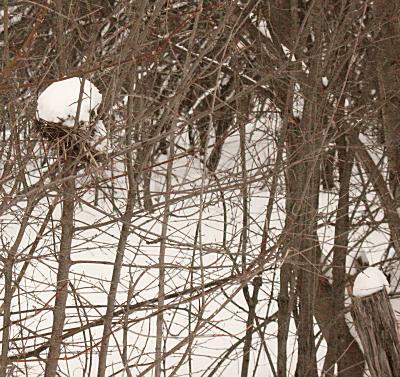
photo - mw
_______________________
Presence of an External Master of Knowledge
Wallace Stevens
introduced by Mick Imlah
Under the shape of his sail, Ulysses,
Symbol of the seeker, crossing by night
The giant sea, read his own mind.
He said, "As I know, I am and have
The right to be." He guided his boat
Beneath the middle stars and said:
"Here I feel the human loneliness
And that, in space and solitude,
Which knowledge is: the world and fate,
The right within me and about me,
Joined in a triumphant vigor,
Like a direction on which I depend . . .
...(more)
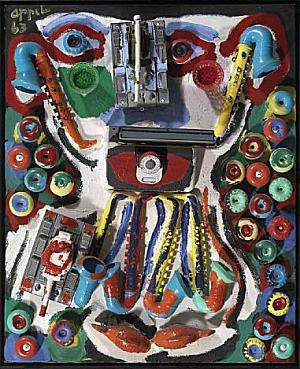
Tell me something
Karel Appel
1963
_______________________
Outcast Narrative
Harold Jaffe
electronic book review
as abject--so the sacred
(Kristeva)
The body is young, tattooed, pierced, cut, punctured, branded. It is brown and black and poor. It is also white and middle class, female and male. How do we read the outcast body?(....)
Put another way, diagnosed madness may in many instances be understood as a self-annilhilating commentary (narrative) on an institutionally mad culture.
I referred to certain spiritual sectors' cultivation of dream for its prophetic properties. The current official culture scarcely acknowledges dream. We wake up after seven or eight hours of sleep punctuated by graphic, concentrated, timeless, passion and perception, and we are encouraged to repress all of it. And proceed with our stressful, programmed, mostly passionless wake-a-day lives as if the dream-narrative never existed. (If you admit to dreaming vividly, official culture is likely to attempt to medicate you.) I call dreams "timeless" because dreamtime narrative is mostly vertical, a-chronological, as opposed to the manipulated, horizontal, time-induced stresses of our wake-a-day.
Jean Baudrillard wonders rhetorically: "Are there two lines to our lives, the one a non-biological, imemorial youth, which we experience in dreams, and the other an organic line of life and death, of duration and of remembrance, with which we identify our pale and mortal existence? Could there be two fundamental sequences and no relation to them? Or is the first simply the projection of the second, its hallucinatory discourse, as, deep, down psychaoanalysis argues." Baudrillard endorses the first hypothesis: "We have two existences, each of which is wholly original and independent of the other." Does dream, then, represent perhaps our last frontier, a mode infiltrated by official culture but still maintaining a degree of autonomy which could be channeled into dissident, conceivably even revolutionary, agency via art? It is disputable whether dream is uncontaminated, but let's assume that it mostly is. At some juncture, then, dream-as-narrative might re-seize its dissident potential, as happened, for example, with German Expressionism and Surrealism. But that juncture is not now. People (I'm talking principally of Americans) will have to live and breathe the new world order for some time longer before they come to realize (if they ever do) that the master narrative is strangling rather than succoring them. That they're not grinning and waving but grimacing and drowning....(more)
_______________________
"If I'm serious, and I am, the desert has driven me crazy. Not that I mind"
-
Edward Abbey
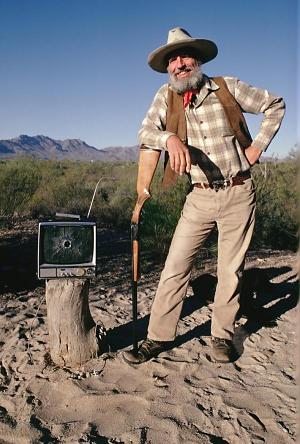
Edward Abbey
January 29, 1927 – March 14, 1989
photo - Terrence Moore Abbey's Web
Excerpts From Desert Solitaire
Edward Abbey
In the shade of the big trees, whose leaves tinkle musically, like gold foil, above our heads, we eat lunch and fill our bellies with the cool sweet water, and lie on our backs and sleep and dream. A few flies, the fluttering leaves, the trickle of water give a fine edge and scoring to the deep background of - silence? No - of stillness, peace.
I think of music, and of a musical analogy to what seems to me the unique spirit of desert places. Suppose for example that we can find a certain resemblance between the music of Bach and the sea; the music of Debussy and a forest glade; the music of Beethoven and (of course) great mountains; then who has written of the desert?
Mozart? Hardly the outdoor type, that fellow - much too elegant, symmetrical, formally perfect. Vivaldi, Corelli, Monteverdi? - cathedral interiors only - fluid architecture. Jazz? The best of jazz for all its virtues cannot escape the limitations of its origin: it is indoor music, city music, distilled from the melancholy nightclubs and the marijuana smoke of dim, sad, nighttime rooms: a joyless sound, for all its nervous energy.
In the desert I am reminded of something quite different - the bleak, thin-textured work of men like Berg, Schoenberg, Ernst Krenek, Webern and the American, Elliot Carter. Quite by accident, no doubt, although both Schoenberg and Krenek lived part of their lives in the Southwest, their music comes closer than any other I know to representing the apartness, the otherness, the strangeness of the desert. Like certain aspects of this music, the desert is also a-tonal, cruel, clear, inhuman, neither romantic nor classical, motionless and emotionless, at one and the same time - another paradox - both agonized and deeply still.
Like death? Perhaps. And perhaps that is why life nowhere appears so brave, so bright, so full of oracle and miracle as in the desert....(more)

Foliage on Canyon Floor
Stephen Strom
_______________________
Desert Solitaire: A Season in the Wilderness
Edward Abbey
google books
The Monkey Wrench Gang
Edward Abbey
Illustrated by R. Crumb
google books
Confessions of a Barbarian:
Selections from the Journals of Edward Abbey
google books
.....................................................
A Prayer for the Traveler
Edward Abbey
May your trails be crooked, lonesome, dangerous, leading to the most amazing view. May your mountains rise into and above the clouds, May your rivers flow without end, meandering through pastoral valleys tinkling with bells, past temples and castles and poets towers into a dark primeval forest where tigers belch and monkeys howl, through miasmal and mysterious swamps and down into a desert of red rock, blue mesas, domes and pinnacles and grottos of endless stone, and down again into a deep vast ancient unknown chasm where bars of sunlight blaze on profiled cliffs, where deer walk across the white sand beaches, where storms come and go as lightning clangs upon the high crags, where something more beautiful and more full of wonder than your deepest dreams waits for you - beyond that next turning of the canyon walls.
_______________________

Floor of Canyon de Chelly
Stephen Strom
1 2
_______________________
The Deserts In Literature
The Arid Lands Newsletter
Spring/Summer 1994, Issue No. 35
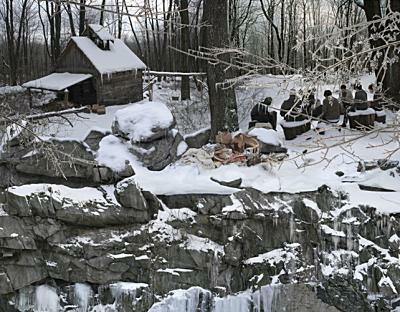
Ice Storm
Anthony Goicolea 1 2 3
_______________________
Figures of Subjective Destiny:
On Samuel Beckett
Alain Badiou
“Decision no sooner reached or rather long after than what is the wrong word? For the last time at last for to end yet again what the wrong word? Than revoked. No but slowly dispelled a little very little like the wisps of day when the curtain closes. of itself by slow millimetres or drawn by a phantom hand. Farewell to farewell. Then in that perfect dark foreknell darling sound pip for end begun. First last moment. Grant only enough remain to devour all . Moment by glutton moment. Sky earth the whole kit and boodle. Not another crumb of carrion left. Lick chops and basta. No. One moment more. One last. Grace to breathe that void. Know happiness.”
This is also what I would like to call the writing of the generic: to present in art the passage from the misfortune of life and of the visible to the happiness of a truthful arousal of the void. This requires the immeasurable power of the encounter, the wager of inventing a name, as well as the combination of wandering and fixity, of imperative and story. And if all this traces the division of the night, then under these rare conditions alone one may repeat with Beckett; in Enough: “Stony ground but not entirely“. But let me finish that talk in the french language of Beckett : terre ingrate, mais pas totalement....(more)
_______________________

OTTAWATER
Fifth Issue
Founded to celebrate the 150th anniversary of the City of Ottawa, Canada's glorious capital city, "ottawater," and its chemical formula/logo "O2(H2O)," is a poetry annual produced exclusively on-line, in both readable and printable pdf formats, and found at (http://www.ottawater.com). An anthology focusing on Ottawa poets and poetics, its first issue appeared in January 2005, 150 years after old Bytown became the City of Ottawa.
via rob mclennan
_______________________
from
Cities and beaches
Sigfús Daðason
Transl. Eiríkur Örn Norðdahl
What lies what dishonesty what historical disasters.
And despite this the morning still amazes us
like before resembles bright and wide mornings
south wind ocean storm in a city mostly made up of dreams.
Dreams: at their bottom we sensed the merciless attack of reality.
How distant they now seem the endless spring eves
that were truth at the time
for us that strolled along the practically untouched beachfront
in the center of the most improbable city in the world
all all all
is forgotten and erased and becomes new.
...(more)
_______________________
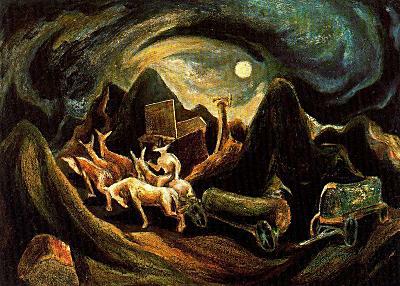
Going West
Jackson Pollock
b. Jan. 28, 1912
_______________________
The Land Yacht
Spurious reviews Roberto Bolano's 2666
I look at my notes, wondering what I was thinking. Slog, says one. Wonders on every page, says another. Whimsically mad, says another. Keeping the wheels turning. Logorrhea - no doubt spelt wrong, and didn't I mean graphomania? ...
(....)
And I begin to remember: that was what I was going to write in my daft imaginary review. That was what I was dreaming about in the cellar. I would have said what drove me through this book and some other books by Bolano was that racing, racing narrative, out ahead of me and all of us and Bolano, who, after all, didn't have long to live.
A racing narrative - and racing against what? Death - he didn't have long to live, Bolano, everyone knows that. But perhaps there is a racing that has no against. A racing like that of the skywriter of the still-too-Magic-Realist Distant Star. Racing that is the life of writing, and that leaps out ahead of it. That mystic point ahead of writing and drawing it on, and drawing the whole of the narrative with it, magnetising every narrative filing....(more)
_______________________
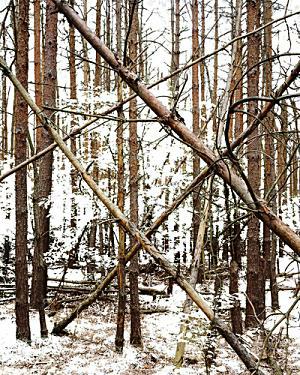
subtraction
sebastian lemm
via tim atherton
_______________________
Beckett with Lacan
Slavoj Zizek
part 1 and part 2
via Continental Philosophy

Early Morning
Samuel Palmer
b. Jan. 27, 1805
_______________________
The Cenotaph
(September 1919)
Charlotte Mew
Not yet will those measureless fields be green again
Where only yesterday the wild sweet blood of wonderful youth was shed;
There is a grave whose earth must hold too long, too deep a stain,
Though for ever over it we may speak as proudly as we may tread.
But here, where the watchers by lonely hearths from the thrust of an inward sword have more slowly bled,
We shall build the Cenotaph: Victory, winged, with Peace, winged too, at the column’s head.
And over the stairway, at the foot—oh! here, leave desolate, passionate hands to spread
Violets, roses, and laurel, with the small, sweet, tinkling country things
Speaking so wistfully of other Springs,
From the little gardens of little places where son or sweetheart was born and bred.
In splendid sleep, with a thousand brothers
To lovers—to mothers
Here, too, lies he:
Under the purple, the green, the red,
It is all young life: it must break some women's hearts to see
Such a brave, gay coverlet to such a bed!
Only, when all is done and said,
God is not mocked and neither are the dead
For this will stand in our Marketplace—
Who’ll sell, who’ll buy
(Will you or I
Lie each to each with the better grace)?
While looking into every busy whore's and huckster's face
As they drive their bargains, is the Face
Of God: and some young, piteous, murdered face.
.....................................................
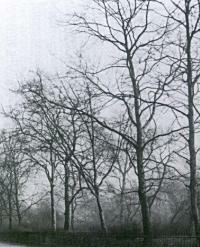
trees close to Charlotte Mew's home
shortly before they were felled
Charlotte Mew Chronology
with mental, historical and geographical connections
linking with her own words, and listing her essays, stories, poems and friends.
Betty Falkenberg with Andrew Roberts
A Middlesex University resource
The Trees Are Down
Charlotte Mew
1869 - 1928
In Praise of Tree-Valor
Charlotte Mew anticipates the contemporary narrative lyric—and possibly her own unfortunate end—in her neglected classic, "The Trees are Down."
Molly Peacock
thanks to Peter Culley
_______________________
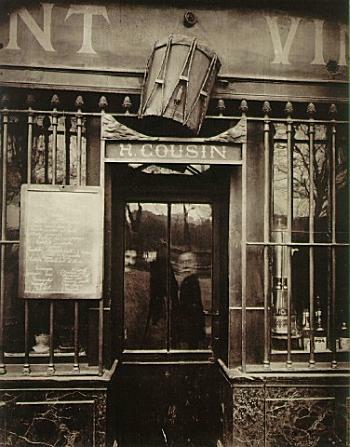
Au Tambour
1908
Eugène Atget
(1857 – 1927) 1 2 3
_______________________
Camera and the consciousness
Manisha Verma
3quarksdaily
Photographers operating within the terms of Surrealist sensibility, with its emphasis on the poetry of the unconscious, seem at first to be at odds with the concept of attaining a heightened sense of reality instead of in fact escaping it. La Revolution Surrealiste, a publication by Surrealists in Paris between 1924 and 1929, known to be consistently scandalous, culturally radical and revolutionary, contained documentary style photographs by Eugene Atget, made for different ends but later discovered to be examples of unconscious Surrealism. Very soon, the Surrealists came more broadly to view Atget's deserted cityscape as images of a haunted urban environment pregnant with possibilities. The physical process of picture taking was simultaneously used for recording everyday reality while probing beneath its surface to reveal new possibilities of meaning. In his unintentional modern approach to photography, Atget's urban scenes - featuring snatched glimpses, tangential perspectives, odd reflections and bizarre details convey a distinct perspective, and one which Walter Benjamin later described as how they operated beyond their ostensible purpose appearing uncannily like a 'scene of crime'. Similar photography enthusiasts of that era went to the extent of suggesting the vanity of even trying to understand the world and instead, proposing that we 'collect it' - in photographs. Atget's images of vanished Paris were understood not as the work of a self conscious professional artist, but as spontaneous visions of an urban primitive, and in his photographs of the deserted streets of old Paris and in shop windows haunted by elegant mannequins , as the Metropolitan Museum describes it - the Surrealists recognized their own vision of the city as a "dream capital", an urban labyrinth of memory and desire. ...(more)
_______________________
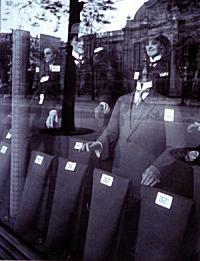
Eugène Atget
_______________________
At the Window
Landis Everson
Insanity is a precious thing under
an umbrella and grows like twisted vines
in our heads. Sometimes the rain comes down
to tickle us and drown out our tears.
The cows outside the institution
have none of our fears. At the window
the bars seem to shift shadows
on the backs of the sweet beasts, and
I wonder at the pastures of peaceful stupidity
that are always inside them to eat.
Like zebras one moment, if the sun
is just right with the bars, their made-up
stripes dance, until the rains come
to put them out. I wonder why
these magic drops tickle when they don’t
hit me on the ears and like crinkled paper
getting wet, the vines uncurl and grow straight
until the rain stops and waits for the zebras.
Landis Everson - Five New Poems
Landis Everson feature
Jacket
In Memoriam: Landis Everson
1926 - 2007
Rachel Aviv
On the Terrace
Landis Everson
The lonely breakfast table starts the day,
an adjustment is made to understand
why the other chair is empty. The morning
beautiful and still to be, should woo me. Yet
the appetite is not shared, lost somewhere in memory.
How lucky the horizon is blue and needs
no handwriting on its emptiness. I am
written on thoroughly, a lost novel
found again. I remember the predictable plot too late,
realize the silly, sad urgency of moss.
_______________________
The San Francisco Renaissance:
Poetics and Community at Mid-Century
Michael Davidson
google books
_______________________
America and the Tintype
Steven Kasher
Reviewed by Jörg Colberg
Because of their nature, tintypes are prime examples of vernacular photography, so anybody interested in this type of photography might want to check out America and the Tintype. I'm often under the impression that many people appreciate vernacular photography mostly because of the "weirder" images (people wearing clothes that are completely out of style now etc.). With its focus, America and the Tintype for the most part also falls into this category. Since its author is interested in the tintype studio as "a kind of performance space where sitters could act out their personal identities" this is easily understandable. However, it does diminish the simple and endearing beauty of many of the less spectacular tintypes.
Given the fact that tintypes are not very often seen, America and the Tintype is definitely destined to become the landmark book in this area. One can hope that an increased appreciation of this form of photography will result in a larger interest in what one could truly call the first democratic form of photography....(more)
.....................................................
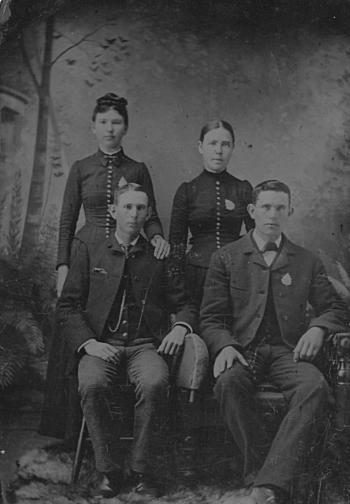 my great grandmother
and siblings
c. 1875
.....................................................
The tintype is actually an image produced on a very thin piece of iron, not tin. The process is quite similar to the ambrotype: the light-sensitive collodion mixture is applied to the iron plate and exposed in the camera while still wet. Because the plate has previously been given a black finish, the negative produced by the camera actually results in a positive image. Hamilton Smith, a chemistry professor at Kenyon College in Ohio, discovered this process in 1854. His student Peter Neff financed the development of the process and patented it in 1856. Tintypes were even cheaper than ambrotypes. They were also durable and could be sent through the mail. Hundreds of thousands of soldiers during the Civil War had tintypes made by studio or itinerant photographers to leave as mementos with loved ones and friends or to send home by mail from the front. Tintypes rapidly supplanted both daguerreotypes and ambrotypes because they were cheaper, easier to produce, and readily transportable. Other names for the tintype include "melainotype" and "ferrotype." Tintypes are also unique items like the daguerreotype, although some studios employed multiple lens cameras to produce multiple images from a single portrait sitting.
- Gregory Fried, True Pictures
Tintype(a history) City Gallery
The main advantages of the tintype were threefold: it created an unbreakable, durable, photographic image supported on an iron plate, which could be carried into hazardous conditions such as battle without breaking like the fragile daguerreotype; it was the first truly instant photograph, ready for the sitter in a few minutes; it was inexpensive, its lowered cost of production meant working class could own photographs. Indeed, the tintype remained popular at seaside resorts and county fairs well into the 20th century exactly because it was the only instant photograph available. Later, its function was replaced by instant photo booths and the Polaroid cameras in the 1950s. The tintype had one of the longest periods of popularity of any early photograph type, lasting from the mid 1850s to the 1930s mostly at county fairs. ...(more)
Tintype on Flickr
_______________________
Alice Notley Video Constellation
A collaboration between Birkbeck, Intercapillary
Space and Openned.
_______________________
DJ Spooky reads John Ashbery
Five Branch Tree
_______________________

Mississippi River
no, not that one
Almonte, Ont.
photo - mw
_______________________
Dada in the Classroom
Andrei Codrescu
An “intermediate poetry class” is the product of decades-long elaboration of an absurdity that once ensconced within the English Department and the Humanities could only be dislodged by a major thought earthquake, equal in potency to the Dada revolution. No such earthquake-revolution has occured in the teaching of the humanities since Dada itself became the predominant pedagogy of our “higher education” system in the post-modern Sixties.
Some scholars would trace the introduction of Dada teaching in the humanities to the beginning of American education, with its menu of “electives.” “Electives” are Dada by nature, a quality that did not escape Ezra Pound, who credited “electives” for the opening in his poetry to other languages, quotation, parody, ironies, essaying, verse free to dance on the page and out of prosodic strictures, and the introduction of elements hitherto alien to poetry, such as economic opinions.(....)
The Dadaists were prolific generators of forms: assemblage, collage, decoupage, simultaneous readings, collaoration (cadavre-exquis), noise making, tattooing innocents, placing people on bookshelves and books in spectators’ seats, wearing hats made from bird cages. Their fertility gave birth to the styles, looks, attitudes, and objects of the 20th century, but the best results were not the objects, but the process of making them.
The current thinking in the humanities is that creativity and artistic production are good things, so good, in fact, that their subversive qualities could be overlooked. After all, Dada, like other modern movements, has been studied to death; nothing alive could survive such exegesis. I am willing to bet, however, that 10 years hence, my fruit-writing students, now in advertising and new media, will look back on their school years and remember nothing except the Dada moment in their “intermediate” poetry class. Is Dada pedagogy useful in today’s clasroom? There isn’t any other worth the absurd price of “higher education.” More Dada!...(more)

Ghosts of the Faithful Departed
abandoned Irish homes
David Creedon
via Sheila Lennon
_______________________
Intervalles 4/5
Fall 2008/Winter 2009
Interdisciplinary Transcriptions
Edited by Jon Cotner and Andy Fitch
Centre Interdisciplinaire de Poétique Appliquée - Université de Liège
via Openned
Mogao Cave Paintings Reimagined [pdf]
Susan Bee
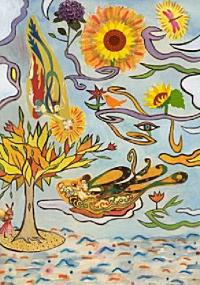 I've been working on some paintings and drawings that involve collaged images of flying angels from the Mogao Caves in Dunhuang, China, which I visited in the summer of 2007. The Mogao Cave temples at the edge of the Gobi desert are filled with one of the most extensive and exquisite collections of Buddhist paintings and sculptures in the world. Every surface of the walls and ceilings is covered with images. I resituate these ancient images into a new imaginary context.
_______________________
Dunhuang Mogao Caves Pictures
Dunhuang
Caves of the Singing Sands
Buddhist Art from the Silk Road
text by Roderick Whitfield; photographs by Seigo Otsuka
Introduction
The cave-temples near the town of Dunhuang form what is arguably the world's most extraordinary gallery of Buddhist art: a gallery whose magnificent mural paintings and stucco sculptures were not collected from distant sources but were created in situ over a period of nearly a thousand years. Moreover, one particular cave contained a sealed library whose contents, consisting of written documents, silk paintings and woodblock prints, reflect contacts with every major Buddhist centre of both Central Asia and the Chinese empire.
_______________________

The Mogao Caves
Emma Nicholas and Brendan Fletcher
at
Walking the Wall
_______________________
OCHO #21: MiPOesias Print Companion
Nick Piombino (Editor)
Dedicated to the memory of Emma Bee Bernstein
While cultural distancing, social derealization, corporate
confabulation and synthetic substitution drive and lure so many
towards an ever more mechanized and soulless existence, outspoken,
inventive poets like those in this issue of OCHO are working
energetically to redirect themselves and us towards the pleasures and
pains of thinking for ourselves, and the spontaneous and generative
living that is the gift of insight.
- Nick Piombino
from
Some Serious Frags
Laura Elrick
Is the enemy internal
Is the enemy internal is one question. All boundaries sieves. All
unities pre-skeletal. A short way out of the Sbarro, the landscape
turned biblical. Petty bourgeois boys holed up with Kalashnikovs on
a hill. The type of siege. The type of silence. Take nothing for natural.
Even jouissance.
_______________________
Breathing Room
Martine Bellen
conjunctions
Instruments of music and surgery,
Statues of birds and kings,
Chapters illuminated by gaslight:
Visual features differentiated in space, not time.
I’m reading a book about monkeys and their languages. Did you know
With their innumerable dialects, most comprehend
Each other no better than you and I?
When a tongue functions as a contour seen as boundary.
The difference between centrality and infinity.
Because of internal contradictions of love
I believe in a host of unlikely divinities.
A scene shifts from dream-room to living
Room. Living room to cubist painting.
In simple isometric
Rectangles.
The balance of immutable force.
A surface is a translation of a three-dimensional image.
Some parts must be excluded. Distance
Between a window and its view
On the vertical axis.
...(more)
Web Conjunctions Poetry Festival, Winter 2009
_______________________

Ghosts of the Faithful Departed
David Creedon
_______________________
What Makes a Poem a Poem?
Charles Bernstein
Part of the University of Pennsylvania's "60-Second Lecture" series. April 21, 2004.
Intervalles 4/5
It's not rhyming words at the end of a line. It's not form. It's not structure. It's not loneliness. It's not location. It's not the sky. It's not love. It's not the color. It's not the feeling. It's not the meter. It's not the place. It's not the intention. It's not the desire. It's not the weather. It's not the hope. It's not the subject matter. It's not the death. It's not the birth. It's not the trees. It's not the words. It's not the things between the words. It's not the meter. It's not the meter--
[timer beeps]
It's the timing
_______________________
Transcribing Gods' Words [pdf]
Richard Price
Intervalles 4/5
Capturing the flavor of the speech of possession gods (tutelary spirits), through
transcription and translation, and juxtaposing and contrasting it with that of humans
poses special challenges for the ethnographer. Two chapter-fragments from the recently
published Travels with Tooy exemplify my own attempt to deal with these problems.
Some brief introductory materials can provide necessary background for the texts them-
selves.
Thirty-five years into my research with Saramakas I met Tooy, and it wasn't long
before he took me through the looking glass and down the rabbit hole. He has shared
with me hidden worlds that, for him, make life worth living and, for me, continue to
amaze and fascinate. Clifford Geertz has called anthropologists "merchants of astonish-
ment." But for me, it's Tooy who plays that role. .....
_______________________
Transcription [pdf]
Bob Perelman
Intervalles 4/5
At times I get like some Bartleby in reverse and type out the work of other writ- ers. I do it both for pleasure and to practice, somehow or other, the craft.
At the very least, it's typing practice, which I always need. I have a fantasy of typing quickly, accurately, effortlessly, with the fluency of someone like Kerouac (120 wpm), the impossible ego-ideal. To have no conscious interference, but simply to allow the incipient impulse to be articulated in sequentially appearing letters on the screen, the words gathering to say what they, unbeknownst to me before that extending moment, actually wanted to say--the analogy is with music, feeling it under your fingers as you're hearing it. The scratchier truth is that, after all these years, I'm a fairly lousy typist, better than I was back before there were computers, but hardly reaching mediocrity in my better stretches. This forces me to think and rethink, assert and reframe, typing a few strokes then lifting my fingers off the keys as I stare at the cursor blinking from its little rut of error. It's a toss-up whether I then abandon incipient formations whose begin- nings lie on the screen in mistyped botches, or delete a bit, back up, and soldier on. The overall activity of my typing/writing is a mix of keystrokes, staring, thinking, deleting, starting over, getting frustrated, giving up, printing up the offending half-baked draft onto the distancing, objectifying paper, which I later hover over with a pencil or pen, correcting, amplifying, beginning, at best, to find something of interest, which I then go back to the keyboard to continue shaping. ...
_______________________
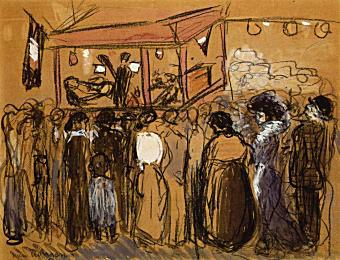
The Music Kiosk
Kees Van Dongen
b. Jan. 26, 1877
_______________________
Surfing and Navigating
Or, life with books
Edward Gray
common-place
The Web has done nothing to temper my interest in books. In addition to thinking about books, I read books—many of them. But my experience as a reader does not exactly follow the pattern put forth by people like Nicholas Carr, who’s recent Atlantic Monthly article, "Is Google Making us Stupid?" ... , contains the following observation: "The deep reading that used to come naturally has become a struggle … My mind now expects to take in information the way the Net distributes it: in a swiftly moving stream of particles. Once I was a scuba diver in the sea of words. Now I zip along the surface like a guy on a Jet Ski."
What exactly is this "deep reading"? If my experience is any indication, it’s a red herring. For me, reading printed books has always included a certain amount of drift, even a bit of Jet Skiing. Almost immediately upon starting a book I ask myself—usually while reading—what will I read next: should it be more fiction? a history book? current events? pure escape? enrichment? This is not simply the stuff of daydreams. These are relational questions: what most naturally follows from what I’m reading now? What will add to the experience of the present book? Will it be something related by topic or by genre? The process is almost identical to what happens when I go hunting on the Internet for answers to a research question. But the cognitive parallels of reading and Web surfing don’t begin to capture the depth and extent of my thinking about books....(more)
_______________________
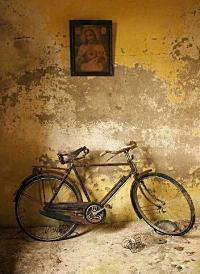
David Creedon
_______________________
Shelley introduces a new project - The Frugal Algorithm
I created The Frugal Algorithm for the same reason people sang Brother, Can You Spare a Dime in the 1930s-to face today's difficult times head on. Rather than curl up in a fetal ball, waiting for some miracle to make the current economic situation go away, the Frugal Algorithm embraces the economy of today, and celebrates it as a way to redefine who we are.
We are too often seen as consumers in a disposable society, whose primary interest is what new toy to buy, and how much garbage we generate. When faced with difficult times, we buckle down reluctantly, anxiously waiting when the times are better and we can return to a time of "prosperity", prosperity in this context meaning buying more stuff. Our societies are based on the concept that worth is measured in goods, and the ultimate health of the collective is based in gross national product and balance of trade. We work to buy, and we buy to work.
But what if we broke the cycle?
via Doug Alder
_______________________
Virginia Woolf’s ‘laptop’
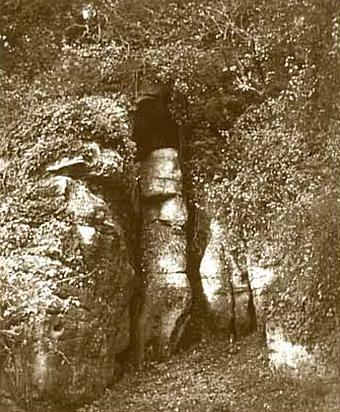
Cleft
Rock-Anchor Church, Derby
ca. 1860-65
Ernest Edwards
(1837-1903) British Masters of the Albumen Print
A Selection of Mid-Nineteenth-Century
Victorian Photography
Robert A. Sobieszek
_______________________
The Brain, within its Groove
Runs evenly—and true—
But let a Splinter swerve—
'Twere easier for You—
To put a Current back—
When Floods have slit the Hills—
And scooped a Turnpike for Themselves—
And trodden out the Mills—
-
Emily Dickinson
_______________________
Parrhesia: Issue 5, 2008
‘You cannot make a living just being a theoretician': [pdf]
An Interview with Jean-Michel Rabaté
Beyond Resistance: [pdf]
a response to Žižek’s critique of Foucault’s subject of freedom
Aurelia Armstrong
Between Rupture and Repetition: [pdf]
Intervention and Evental Recurrence in the Thought of Alain Badiou
Hollis Phelps
_______________________
N1BR: Issue One
n+1 initiates an online bookreview
edited by Carla Blumenkranz
Richard Rorty: The Making of an American Philosopher
Neil Gross
Reviewed by Gideon Lewis-Kraus
Rorty is instructive if you want to leave a discipline, not if you want to save one. Rorty's last year in the Princeton philosophy department was 1981. For the next sixteen years he was University Professor of the Humanities at the University of Virginia. He retired out of Stanford's Comparative Literature department, though his initial hope in moving west was that he might be named Transitory Professor of Trendy Studies. Philosophy, for its part, is less relevant than ever; its graduate programs continue to attract students drawn to haughty ascetic ideals of purification rather than aspirations to the enlargement of the self. Rorty, from time to time, seemed genuinely sad about this. The publication of Richard Rorty got Gross tenure. With the strategic portion of his career thus concluded, one wonders what Gross's own intellectual self-concept might do for the sociological project....(more)
_______________________
Tag clouds and the decline of symbolic efficiency
Jodi Dean
_______________________
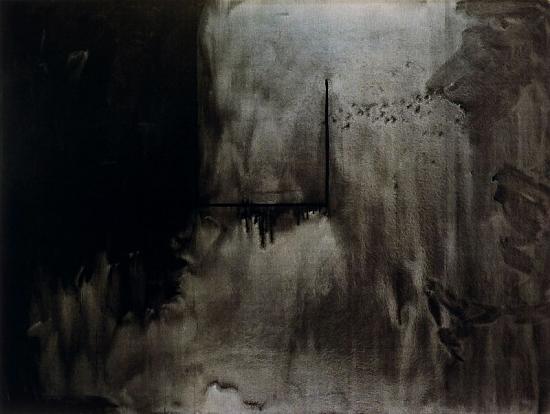
In Plato's Cave
Robert Motherwell
b. Jan. 24, 1915 71 images
_______________________
The Present
Ernst Herbeck
Translated by Gary Sullivan.
The present's a quiet orphan,
we just want to be having fun.
I have gone now into the woods,
and will return soon without the goods.
with alternate translations
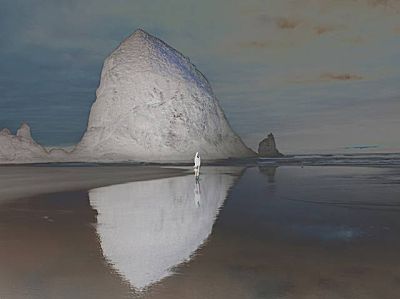
Richard Misrach 1 2 3 4 5 6
via George LeChat
_______________________
I often come across pages I wrote in my youth, when I was seventeen or twenty, and some of them reveal an expressive power I can't remember having back then. There are certain phrases and sentences written in the wake of my adolescence that seem like the product of the person I am now, with all that I've learned in the intervening years. I see I'm the same as I was. And since in general I feel that I've greatly progressed from what I was, I wonder where the progress is, if back then I was the same as now.(...)
I let my mind wander, and I'm sure that what I'm writing I've already written. I remember. Änd I ask the one in me who presumes to exist if in the Platonism of sensations there might not be another, less vertical anamnesis - another pre-existing life that we vaguely remember but that belongs only to this life. ...
My God, my God, who am I watching? How many am I? Who is I? What is this gap between me and myself?
-
Fernando Pessoa, The Book of Disquiet, translated by Richard Zenith
_______________________
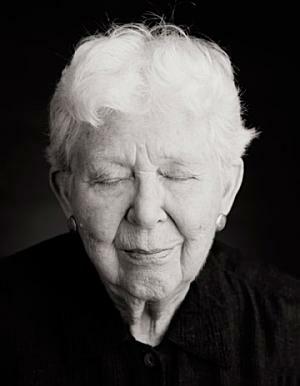 Rememory
Susan Dobson
Memories are made of this
Photography by Susan Dobson
Story by Lori Bona Hunt
In the photograph, she is an 80-year-old woman, eyes shut, soft white hair a stark contrast to the black background, fine lines and wrinkles illuminated by the light of the camera’s flash.
But hidden behind those closed eyes is a young girl, just at the beginning of who she will be. You can’t see her on the surface, but she is there. For they are one and the same, these two, separated only by years.
It's a symbiotic relationship caught on film, yet not visible to a beholder’s eye. But look closer, deeper, and you will see hints of the duality -- like the old woman’s gentle smile, the kind only a sweet memory can bring....(more)
_______________________
Love After Love
Derek Walcott
The time will come
when, with elation
you will greet yourself arriving
at your own door, in your own mirror
and each will smile at the other's welcome,
and say, sit here. Eat.
You will love again the stranger who was your self.
Give wine. Give bread. Give back your heart
to itself, to the stranger who has loved you
all your life, whom you ignored
for another, who knows you by heart.
Take down the love letters from the bookshelf,
the photographs, the desperate notes,
peel your own image from the mirror.
Sit. Feast on your life.
.....................................................
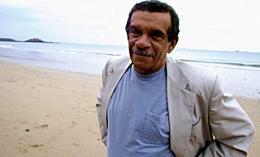
Derek Walcott
b. Jan. 23, 1930
Photograph: Sophie Bassouls/Corbis
Forty Acres:
a poem for Barack Obama
Derek Walcott
times on-line
Out of the turmoil emerges one emblem, an engraving —
a young Negro at dawn in straw hat and overalls,
an emblem of impossible prophecy, a crowd
dividing like the furrow which a mule has ploughed,
parting for their president: a field of snow-flecked
cotton
forty acres wide, of crows with predictable omens
that the young ploughman ignores for his unforgotten
cotton-haired ancestors, while lined on one branch, is
a tense
court of bespectacled owls and, on the field's
receding rim —
a gesticulating scarecrow stamping with rage at him.
The small plough continues on this lined page
beyond the moaning ground, the lynching tree, the tornado's
black vengeance,
and the young ploughman feels the change in his veins,
heart, muscles, tendons,
till the land lies open like a flag as dawn's sure
light streaks the field and furrows wait for the sower.
_______________________
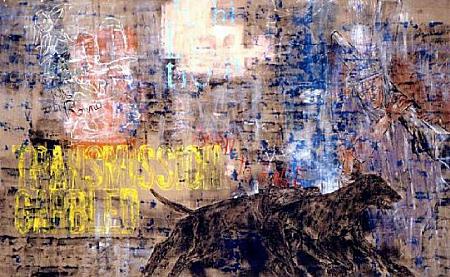
Jubilance
Leon Golub
b. Jan. 23, 1922
1 2
_______________________
In Media Res: A MediaCommons Project
MediaCommons
a digital scholarly network
_______________________
We’re In This Together, Individually:
Report from a roundtable discussion on “The World of the Translator”
Nicolle Elizabeth
words without borders
_______________________
From Here to There
a collective of artists currently living and working in Los Angeles.
The Exposure Project
_______________________
"For that (the rapt one warns) is what papyr is meed of, made of, hides and hints and misses in prints. Till ye finally (though not yet endlike) meet with the acquaintance of Mister Typus, Mistress Tope and all the little typtopies. Filstup. So you need hardly spell me how every word will be bound over to carry three score and ten toptypsical readings throughout the book of Doublends Jined..."
-
Joyce, Finnegans Wake
_______________________
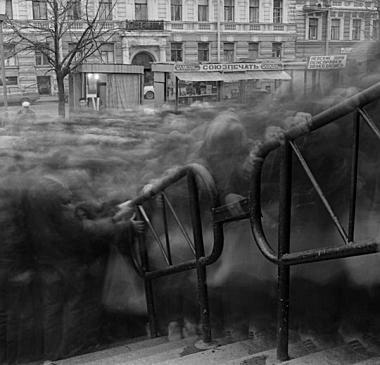
Alexey Titarenko
1 2 3
_______________________
from
Forest Of Europe
Derek Walcott
From hand to mouth, across the centuries,
the bread that lasts when systems have decayed,
when, in his forest of barbed-wire branches,
a prisoner circles, chewing the one phrase
whose music will last longer than the leaves,
whose condensation is the marble sweat
of angels' foreheads, which will never dry
till Borealis shuts the peacock lights
of its slow fan from L.A. to Archangel,
and memory needs nothing to repeat.
Frightened and starved, with divine fever
Osip Mandelstam shook, and every
metaphor shuddered him with ague,
each vowel heavier than a boundary stone,
"to the rustling of ruble notes by the lemon Neva,"
but now that fever is a fire whose glow
warms our hands, Joseph, as we grunt like primates
exchanging gutturals in this wintry cave
of a brown cottage, while in drifts outside
mastodons force their systems through the snow.
...(more)
A Multiplicity of Voices
A Conversation with Derek Walcott
The Antilles: Fragments of Epic Memory
Derek Walcott
Nobel Lecture, December 7, 1992
Selected Poetry
Derek Walcott
google books
_______________________
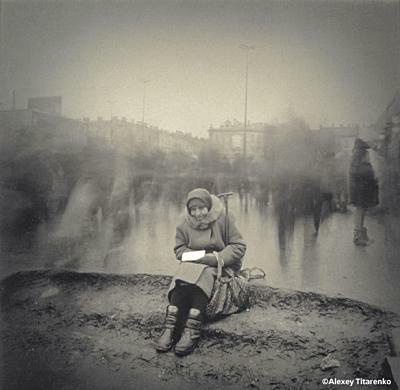
Alexey Titarenko
_______________________
Page Views
Reviews and reportage on books
a new blog at the Columbia Journalism Review
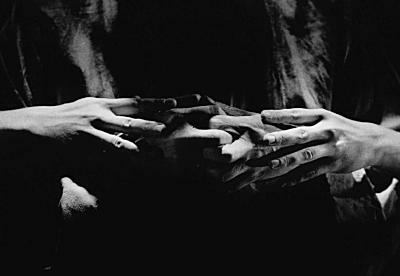
Johnny Murphy and Ali White
Catastrophe
1999
Images of Beckett
James Knowlson, John Haynes
google books
John Haynes Photography
18 books on Beckett
Scars of Différance
thanks to Mark Thwaite
_______________________
from
Silent Languages
Terri Vaughn
Znine
When my father was dying that slow death that steals all language
He used to stutter meaning into sentences,
He used hand motions instead of sounds.
As he struggled to communicate, his eyes often begged for comprehension,
But people would turn away, loving their own conversations,
Syllables they understood with shallow meanings,
Never noticing the deep language between his faltering words.
At first I faltered too, fighting to learn his language, searching within myself
To grab each stuttered syllable and hold it until that sound became mine.
His eyes were the key to conversing in that broken way,
They begged me to listen and to construct knowledge from the silences,
To find in the movement of his hands the intensity of human hope,
To grasp beyond the broken sentences and hear the resonance of a man’s heart;
I learned the depths of language in those years that my father was dying a slow death.
(...)
Your language reverberates when you don’t speak, and I listen to each syllable of open sound,
Striving to realize why you keep me guessing, but fearing the appearance of real expression.
You communicate in ways I learned with my father; I return intuitively to discover your voice.
Although afraid, I hear language when you say, “You know where I am,” shrugging and pleading simultaneously.
And I want to know, but I don’t dare guess what you mean; I respond, but not in discernible utterance.
I admit that perhaps you are speaking while I am not—I fear I may never give you my voice except in ink.
Still, there may be language in silences and hesitations, the questions of unspeakable desire that
refuses to be satisfied by death.
...(more)
_______________________
Nietzsche/Derrida, Blanchot/Beckett:
Fragmentary Progressions of the Unnamable
Stephen Barker
pmc
To attempt any genealogy, let alone a Nietzschean one, of the kind of fragment one confronts in Nietzsche, Derrida, Blanchot, and Beckett, and to do so within the context of the faux-postmodern,^1^ is to invite more and less obvious problems of orchestration, content, and performativity. Since my desire is to %demonstrate the effect% of the paramodern fragment and its vertiginous effect, from philosophy to "literature," I will desire here instead to move a %poiesis% of the conception and the use of this disruptive and transgressive site; at this site we will discover a poetic Nietzschean and a critique of what Derrida in _Truth in Painting_ calls the parergonal, as a parasite, and thus marginal and contiguous to something --something that may be a nothing -- ostensibly %not% in any margin, a fragmentary circularity.
What is the work of which the marginal, the parergonal, the fragmentary, is outside? How is one to map this exchange, of terms and of texts, and how will this economy of the marginal, the transgressive, the nameless, or unnamable, operate within the aestheticized space of writing and reading?...(more)
_______________________
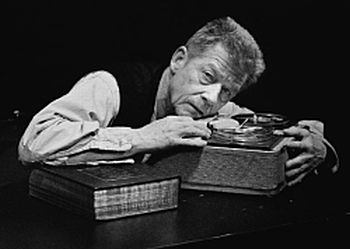
John Hurt
b. Jan. 1, 1940
Krapp's Last Tape
John Haynes Photography
_______________________
I Am Going to Talk About Hope
César Vallejo
trans. by Robert Bly
I do not feel this suffering as Cesar Vallejo. I am not suffering now as a creative person, or as a man, nor even as a simple living being. I don't feel this pain as a Catholic, or as a Mohammedan, or as an atheist. Today I am simply in pain. If my name weren't Cesar Vallejo, I'd still feel it. If I weren't an artist, I'd still feel it. If I weren't a man, or even a living being, I'd still feel it. If I weren't a Catholic, or an atheist, or a Mohammedan, I'd still feel it. Today I am in pain from further down. Today I am simply in pain.
The pain I have has no explanations. My pain is so deep that it never had a cause, and has no need of a cause. What could have its cause been? Where is that thing so important that it stopped being its cause? Its cause is nothing, and nothing could have stopped being its cause. Why has this pain been born all on its own? My pain comes from the north wind and and from the south wind, like those hermaphrodite eggs that some rare birds lay conceived of the wind. If my bride were dead, my suffering would still be the same. If they had slashed my throat all the way through, my suffering would still be the same. If life, in other words, were different, my suffering would still be the same. Today I'm in pain from higher up. Today I am simply in pain.
I look at the hungry man's pain, and I see that his hunger walks somewhere so far from my pain that if I fasted until death, one blade of grass at least would always sprout from my grave. And the same with the lover! His blood is too fertile for mine, which has no source and no one to drink it.
I always believed up till now that all things in the world had to be either fathers or sons. But here is my pain that is neither a father nor a son. It hasn't any back to get dark, and it has too bold a front for dawning, and if they put it into some dark room, it wouldn't give light, and if they put it into some brightly lit room, it wouldn't cast a shadow. Today I am in pain, no matter what happens. Today I am simply in pain.
Neruda and Vallejo: Selected Poems
edited by Robert Bly google books
_______________________
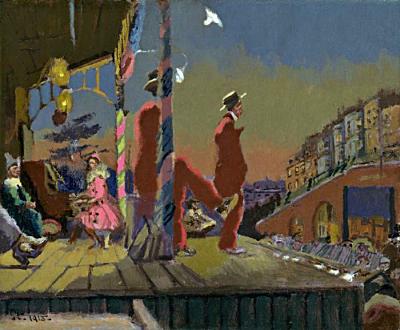
Brighton Pierrots
Walter Richard Sickert 1915
_______________________
The Rise of Capitalism
Donald Barthelme
The first thing I did was make a mistake. I thought I had understood capitalism, but what I had done was assume an attitude -- melancholy sadness -- toward it. This attitude is not correct. Fortunately your letter came, at that instant. "Dear Rupert, I love you every day. You are the world, which is life. I love you I adore you I am crazy about you. Love, Marta." Reading between the lines, I understood your critique of my attitude toward capitalism. Always mindful that the critic must "studiare da un punto di vista formalistico e semiologico il rapporto fra lingua di un testo e codificazione di un -- " But here a big thumb smudges the text -- the thumb of capitalism, which we are all under. Darkness falls. My neighbor continues to commit suicide, once a fortnight. I have this suicides geared into my schedule because my role is to save him; once I was late and he spent two days unconscious on the floor. But now that I have understood that I have not understood capitalism, perhaps a less equivocal position toward it can be "hammered out." My daughter demands more Mr. Bubble for her bath. The shrimp boats lower their nets. A book called Humorists of the 18th Century is published.(...)
Smoke, rain, abulia. What can the concerned citizen do to fight the rise of capitalism, in his own community? Study of the tides of conflict and power in a system in which there is structural inequality is an important task. A knowledge of European intellectual history since 1789 provides a useful background. Information theory offers interesting new possibilities. Passion is helpful, especially those types of passion which are non licit. Doubt is a necessary precondition to meaningful action. Fear is the great mover, in the end....(more)
Donald Barthelme's barthelmismo
jessamyn
_______________________

Water That Floats the Boat
Can Also Sink It
Yun-Fei Ji
2002-2005
1 2 3
Folk Songs of the Flood
Yun-Fei Ji and The Old One Hundred Names
Charles Homans
_______________________
Toward a History of Needs
Ivan Illich
Modernized poverty appears when the intensity of market dependence reaches a certain threshold. Subjectively, it is the experience of frustrating affluence which occurs in persons mutilated by their overwhelming reliance on the riches of industrial productivity. Simply, it deprives those affected by it of their freedom and power to act autonomously, to live creatively; it confines them to survival through being plugged into market relations. And precisely because this new impotence is so deeply experienced, it is with difficulty expressed.(....)
This new impotence-producing poverty must not be confused with the widening gap between the consumption of rich and poor in a world where basic needs are increasingly shaped by industrial commodities. That gap is the form traditional poverty assumes in an industrial society, and the conventional terms of class struggle appropriately reveal and reduce it.(....)
like the new gaps in access, such inequities in social costs are aspects of industrialized poverty for which economic indicators and objective verification can be found. Such is not true for the industrialized impotence which affects both rich and poor. Where this kind of poverty reigns, life without addictive access to commodities is rendered either impossible or criminal. Making do without consumption becomes impossible, not just for the average consumer but even for the poor.
_______________________
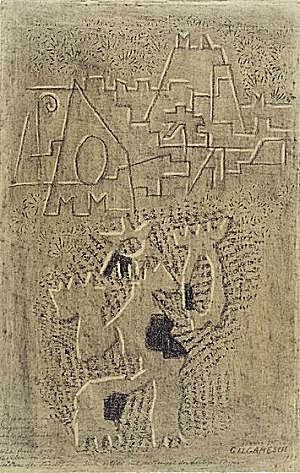
Gilgamesh II/II (Variant)
1943
Willi Baumeister
b. Jan. 22, 1889
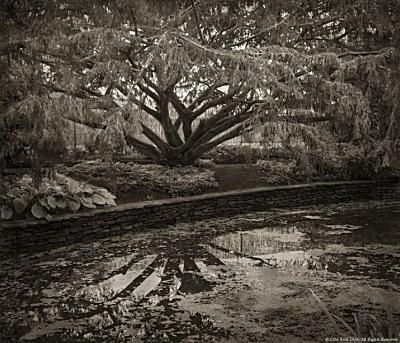
Beth Dow
1 2 3 4
beth dow, and some thoughts on printing
mrs. deane comments on the photgrapher and her printer, Keith Taylor
_______________________
“For Kind”:
Douglas Oliver
1937 - 2000
Kindness acts idly or unnaturally,
leads us into fear. Act in kindness.
Kindness makes you idle, worse, unnatural.
Don’t be afraid of the darkness of kind;
for it’s the birth darkness, vertical twist
of opening lips in the night: life that follows
belongs to you in kind.
quoted by Pierre Joris
Douglas Oliver: Radial Symposium
Intercapillary/Space
The Tea-Brown Light Of Kindness
Pierre Joris
§ Paris, 3 July 2006 — Sitting in a Paris café, reading Douglas Oliver's work. Am in the sixth arrondissement, this specific poem set in the first, in the rue Montorgueil. A meridian we shared: that's where Gisèle Celan-Lestrange lived, a friend we shared (though never met together) and whose husband Paul Celan's work was core to our understanding of late twentieth century poetry. I am reading in a series of poems that speak to Celan and his widow, gathered in the sequence "The Shattered Crystal" in his book Arrondissements:
Shocked by unsuspected absence,
return on the straight road
past Heine's lodgings
to my fishcarter's faubourg.
Gisèle calls me from the outerworld
—once the call was real,
but this is the haunting—
and I half-hear her lovely reply
to a chance remark at dinner
on the Montorgueil. I'd told her:
"A poet's suicide may
for a moment cut the path
of the past to the future."
As I am shocked by this other absence today, Doug's, and now want to replace the word "suicide" with "death" in what he told Gisèle. For certainly the result is the same, as I read his explanation for what he said:
(because there is no bridge
across its dreadful river banks,
though the path one day reforms
after so great a life
as an Iris bridge, yet of stone too.)
Tomorrow I'll cross the river Seine, from my arrondissements to his, a zigzag through Paris, haunted by years of nomadic dérives through this city of dérives (from Baudelaire to the surrealists, from the surrealists to the Situationists, from the hippie soixante-huitards to the s.d.f.'s (sans domicile fixe = homeless) of all nations, for whom Doug had such care, a care he mapped in Arrondissements....(more)
.....................................................
The School of Bedlam
Douglas Oliver
From Whisper Louise, a work-in-progress: a double-memoir inspired by Louise Michel, "Red Virgin" of the 1871 Paris Commune
jacket
Ventriloquising Against Harm
John Hall reviews Whisper ‘Louise’: A double historical memoir and meditation
by Douglas Oliver
Whisper ‘Louise’ is part of the larger project of Arrondissements, undertaken on moving to his ‘adopted city’ of Paris for the third time. In a preface written for his contribution to Etruscan Reader VIII (1998) and reproduced in the Salt publication Arrondissements (2003), he provided a sketch of the expansive project to which, as a whole, he was giving this name. ‘More than midway through my life’, he wrote — deliberately invoking Dante’s earlier European project that also brought together poetics and ethics — ‘I have begun writing Arrondissements, a series of books, or long sequences in poetry and prose, designed to reflect the world at large through the prism of Paris’.
In this same preface, he provided a sketch of the ‘sampling so far’. It included what were to become the three main components of the Salt book — ‘The Shattered Crystal’, ‘China Blue’ and ‘Video House of Fame’, together with Salvo for Africa, Whisper ‘Louise’ and ‘Miscellaneous Poems from Arrondissements’. There is no such last collection; ‘Well of Sorrows in Purple Tinctures’ is included in Arrondissements as an individual poem....(more)
.....................................................
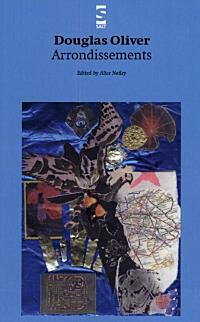
Arrondissements
Douglas Oliver
edited by Alice Notley
salt publishing
Arrondissements
By Douglas Oliver
edited by Alice Notley
google books
_______________________
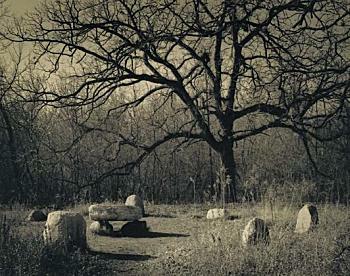
Stone Circle
platinum palladium print
Beth Dow
_______________________
A Time of Colonels
Douglas Oliver
Sappho falls off Lefkada's cliffs
Greek colonels falling with her,
fawn creases fading up the buttocks,
the polished boots descending.
When the waves close over
Sappho lives on, fragmentary
scribbles of a feminist suicide.
The colonels dissolve into tortures.
The sea looks angrily, us
staring down from the heights.
We are totally baffled:
"Colonels? Sappho?
Look, we're just standing here." Douglas Oliver poems
The East Village Poetry Web
.....................................................
Featured Reader Douglas Oliver from The Shattered Crystal
Frequency Audio Journal
A Little Night (2:13)
Evening descending mauve (2:22)
Trink (4:52)
From rue d'Enfer to rue Bleue Again (1:49)
Twilight Flowers (3:31)
The Scarlet Cabinet: A Compendium Of Books
By Alice Notley and Douglas Oliver
Reviewed by Edward Foster
Witz: A Journal of Contemporary Poetics
_______________________
why I don't play with harriet
Anne Boyer
On the internet, it is stupid to imagine that there are borders. It's the stateless state of Google; in this country, our bodies are obedient; we very easily stay in line. Every page is as porous as the next -- links are like holes as much as tentacles. Anyone can link to anyone: you can't stop them. You link to an enemy -- you've given them a kiss. You mention a proper name -- you've added some hook to meet Google's loop. You don't do any of this -- they can still do it to you. Even password protected content is just a few keystrokes from the total oblivion of the public noise. Every image, every word, every bit of code, the entire design of a webpage can be jacked and replicated to exhaustion -- perverted, degraded, rewritten, improved, bricologued, redecorated, turned into new music, poetry, movies, images.
Everyone on the internet is feeding the same machine -- there is no "official" site, no "degraded" site, no "outsider" site, no "establishment" site. There is only a common work, for what it is worth, made of porn and poetry and recipes and those photos of children in Gaza shot in the head, all owned by powers I can't really yet conceive of, all of it vulnerable, also, beyond imagining . The machine is seductive, as a library, also, is seductive. And everyone knows this -- it's also often horrible, with whatever soft horror that comes from fake autonomy, disembodiment, and all those other sacrifices to the machine....(more)
via K. Silem Mohammad
_______________________
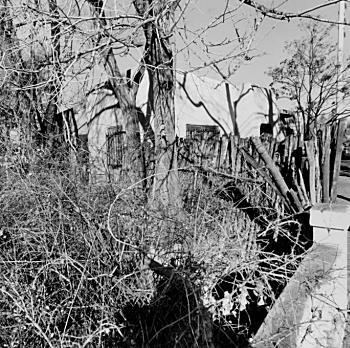
New Mexico
Lee Friedlander
Andrew Smith Gallery
 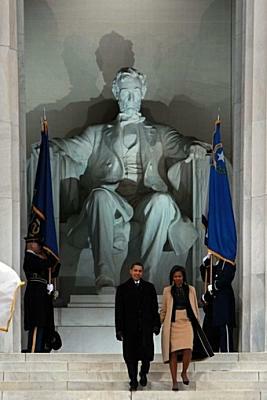
_______________________
Stealing glances
What are we afraid we'll see if we look into a stranger's eyes?
Sheila Heti
spacing
That walking among others should present itself as a dilemma is pathetic. Perhaps it is because we are primarily a culture of drivers, not pedestrians. Even if we do not drive, still we share the streets with many who do, who do not occupy the sidewalks with pleasure but rather are wishing there was less space to travel between the restaurant and their parked car. “Urbanity and automobiles are antithetical in many ways,” writes Rebecca Solnit in Wanderlust, a history of walking. “A city of drivers is only a dysfunctional suburb of people shuttling from private interior to private interior.” This is also true in a city of transit users — we rush to the streetcar stop, take a seat, look through whatever newspaper is lying closest. Walking is no longer, as Solnit points out, “a state in which the mind, the body, and the world are aligned.” As a result, we are jarred by our encounters. Eye contact is an irritation. It disrupts the work of getting somewhere.(....)
... for those of us who are not suffering from the blasé attitude, who are very conscious of the reality of the people we encounter, why do we look away embarrassed or scared, rather than gently, politely, in good conscience? Perhaps in every glance there is desire expressed. I don’t mean sexual desire — though sometimes there’s that — as much as the sort Constant Nieuwenheuys described when he wrote, in 1949, “When we say desire in the twentieth century, we mean the unknown, for all we know of the realm of our desires is that it continuously reverts to one immeasurable desire for freedom.” ...(more)
_______________________

The House of Hysteria
Clarence John Laughlin
1941
_______________________
Recovering Public Memory: Politics, Aesthetics and Contempt
Brian Michael Musgrove
It’s the weekend – leisure time. It’s the interlude when, Guy Debord contends, the proletarian is briefly free of the “total contempt so clearly built into every aspect of the organization and management of production” in commodity capitalism; when workers are temporarily “treated like grown-ups, with a great show of solicitude and politeness, in their new role as consumers.” But this patronising show turns out to be another form of subjection to the diktats of “political economy”: “the totality of human existence falls under the regime of the ‘perfected denial of man’.” As Debord suggests, even the creation of leisure time and space is predicated upon a form of contempt: the “perfected denial” of who we, as living people, really are in the eyes of those who presume the power to legislate our working practices and private identities....(more)
'recover'
M/C Journal
Vol. 11, No. 6 _______________________
from
Lanthanum 14
Henry Gould
An exile, out of woods and snow, finds shelter.
Home, welcome. Laughter and fellowship.
Mutual discovery. What cheer, Netop?
Old matrix of lovingkindness... New World wonder.
The pioneer of our res publica
is granite, now. Benevolent piano-
fingers stretch above the cityscape.
Blackstone preceded him (exile's exile).
...(more)
_______________________
From Daguerreotype to Photoshop
Robin Kelsey
Reviewed by Craig Lambert
The similarities between what Kelsey does with photographs and what art historians do with paintings are greatest with consciously artistic photographs, such as those of Alfred Steiglitz. Yet there are differences. “In the study of painting, one can assume, generally speaking, a high degree of intentionality behind the particulars of the work. Van Gogh used his brush just so, because he wanted the painting to look just like that,” Kelsey says. “With photography, especially the instantaneous photographs using fast shutter speeds that became the norm in the twentieth century, chance plays a much larger role in creating the image.” (Indeed, Kelsey’s next book, due this year, is titled Photography and Chance.) “Chance undercuts your authority over the image,” Kelsey notes. “One of the struggles for photographers in the twentieth century was how to rationalize chance out of the image.”...(more)
via dangerousmeta!
_______________________
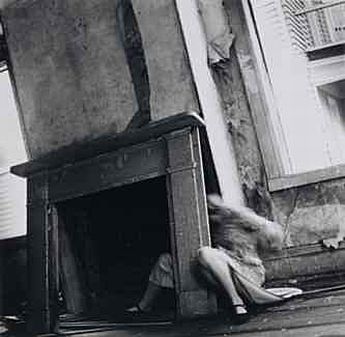
Francesca Woodman
(1958-1981) 1 2 3 4 5
_______________________
Journal of Surrealism and the Americas
Vol 2, No 2 (2008)
Special Issue on Photography
free registration req'd.
A Swimmer Between Two Worlds:
Francesca Woodman’s Maps of Interior Space
Katharine Conley
Clarence John Laughlin, Regionalist Surrealist
Lewis Kachur
Abstract
Evoking a deChirican sensibility of “mystery and melancholy,” Laughlin capitalized upon, yet also ultimately contributed to, the mythology of mysterious New Orleans—city of the marvelous. Thus the possibilities and limitations of Regionalist Surrealism as place finds a test case there. Later in his career, Laughlin would go on to explore Surrealism as place with the rugged topography of the Arizona landscape. The changed locale is accompanied by a shift grounded in Dalian double images.
_______________________
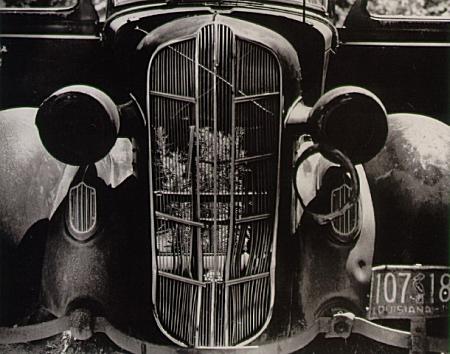 The Imprisoned Landscape
Clarence John Laughlin
1905-1985
1 2 3 4
_______________________
Bookforum - Feb/Mar 2009
Seeing Eye to Eye
Because it’s the product of three independent parties—photographer, camera, subject—the photograph cannot be owned. Indeed, it can affect us in ways the photographer might never have foreseen or desired.
William T. Vollmann
Alien Nation
A trio of new books examine the origins and nature of the fragmented, postmodern american self—while hazarding a look at how the information age will further erode our sense of work, leisure, and place.
By Tom Vanderbilt
_______________________
A Way of Proceeding:
Joseph Beuys, the Epistemological Break and Radical Thought Today
Gerry Coulter
Since Beuys’s death, social thought has become radicalized in ways he could not foresee due to the work of thinkers such as Baudrillard. Radical theory is no longer understood as imbued with radical politics but exists purely as a form of challenge – including a challenge to theory, art, and the political. Radical thought pushes theory toward an escape velocity from a degenerating political which has mutated into a “transpolitical” wherein we can only await a possible “politics to come”. In short, theory after postmodernism in general, and Baudrillard in particular, is not anything like it was in Beuys’s time.
This has also been a period witnessing an incredible movement of social thought and art toward each other – but not as Beuys envisioned. Beuys’s art was not meant to be either decorative or merely reflective but was to function in life as it was lived. Radical thought today, not unlike like Beuys’s conception of art, aims not merely to be reflective but to challenge. While I am someone who is motivated by both Beuys’s art and Baudrillardian radical thought – I understand that it is difficult to imagine two more dissimilar thinkers. Yet Beuys’s work remains strong in its challenge to theory to close the epistemological gap precisely at a time when art and radical thought intersect so radiantly. While it may trouble some Beuyseans greatly, his art continues to function powerfully in an orbit well beyond his politics and ethics. This is a contradiction I have come to appreciate and which informs this writing. It is a contradiction worth pursuing as it provides a unique opportunity to see Beuys’s work anew....(more)
KritikosJournal of postmodern cultural sound, text and image
_______________________
The Humanistic Intellectual: Eleven Theses
Richard Rorty
Kritikos - Volume 3, January 2006
8. In the current flap about the humanities, however, the heresy-hunters have a more vulnerable target than usual. This target is what Allan Bloom calls “the Nietzscheanized left.” This left is an anomaly in America. In the past the American left has asked our country to be true to its ideals, to go still further along the path of expanding human freedom which our forefathers mapped: the path which led us from the abolition of slavery through women’s suffrage, the Wagner Act, and the Civil Rights Movement, to contemporary feminism and gay liberation. But the Nietzscheanized left tells the country it is rotten to the core—that it is a racist, sexist, imperialist society, one which can’t be trusted an inch, one whose every utterance must be ruthlessly deconstructed.
9. Another reason this left is a vulnerable target is that it is extraordinarily self-obsessed and ingrown, as well as absurdly over-philosophized. It takes seriously Paul de Man’s weird suggestion that “one can approach the problems of ideology and by extension the problems of politics only on the basis of critical-linguistic analysis.” It seems to accept Hillis Miller’s fantastic claim that “the millenium [of universal peace and justice among men] would come if all men and women became good readers in de Man’s sense.” When asked for a utopian sketch of our country’s future, the new leftists reply along the lines of one of Foucault’s most fatuous remarks. When asked why he never sketched a utopia, Foucault said, “I think that to imagine another system is to extend our participation in the present system.” De Man, and Foucault were (and Miller is) a lot better than these unfortunate remarks would suggest, but some of their followers are a lot worse. This over-philosophized and self-obsessed left is the mirror image of the over-philosophized and self-obsessed Straussians on the right. The contempt of both groups for contemporary American society is so great that both have rendered themselves impotent when it comes to national, state, or local politics. This means that they get to spend all their energy on academic politics....(more)
_______________________
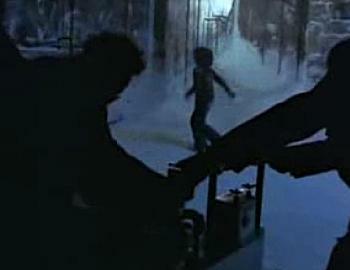
The Making of The Shining
(by Vivian Kubrick)
_______________________
Roll Deep
An interview with Luc Sante
guernica
Luc Sante: Whenever I’ve searched for the origins of rhythm in my life the only thing I’ve ever been able to find is the rhythm of the litanies in the Latin mass—the ora pro nobis iteration in funeral services and the antiphonal ceremony of rogations in the fields. Otherwise music was pretty much absent from my early life—my family didn’t get a record player until I was nine, and the radio only seemed to issue news and soccer, later baseball. Music crept up on me in childhood from a variety of ambient sources. In any case, soul music came to seem like something I’d always known, and—beginning when I was nineteen—reggae even more so, as if I’d somehow heard it in infancy.
Rhythm in writing is somehow analogous, but it’s a completely intuitive matter. I don’t really understand the process. It’s related to the substance of Flaubert’s famous letter to George Sand: “When I come upon a bad assonance or a repetition in my sentences, I’m sure I’m floundering in the false. By searching I find the proper expression, which was always the only one, and which is also harmonious. The word is never lacking when one possesses the idea. Is there not, in this precise fitting of parts, something eternal, like a principal? If not, why should there be a relation between the right word and the musical word? Or why should the greatest compression of thought always result in a line of poetry?” This is crucial stuff for me. I write intuitively, not knowing where I’m going, not knowing what the next sentence will be until this one has guided me there, and knowing how the sentence goes begins with my hearing its rhythm in my head, and then filling in the specific words. If the sentence is cloddish and clunky, it’s simply wrong—and not just wrong-sounding but wrong in its meaning. I realize at this point that I seem to be conflating two separate senses of the word “rhythm”—beat and flow—but they are inextricably linked in my mind and the matter lies largely outside my ability to articulate it. Rhythm also guides my reading, that part of which has nothing to do with acquiring information. There are certain writers whose rhythm is immediately congenial to me. Among the living, I think of Geoff Dyer, whose books I’d devour even if they were about metallurgy or stamp collecting. His rhythm carries me through, exactly the way the rhythm of a dancehall number takes over my body....(more)
Luc Sante: Walloon For The Hell Of Itinterview at Who Walk In Brooklyn
French Without Tears
Luc Sante
Threepenny
Luc Sante blogs at Pinakothek
_______________________
Word Riot - January 2009
via Edmond Caldwell
lots of fresh material up at nthposition
_______________________
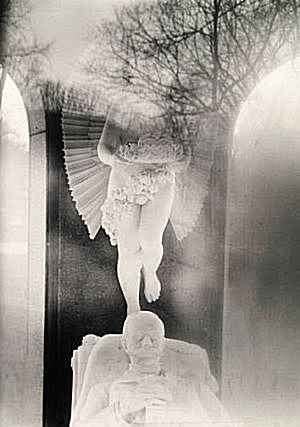
A Vision of Dead Desire
Clarence John Laughlin
1954
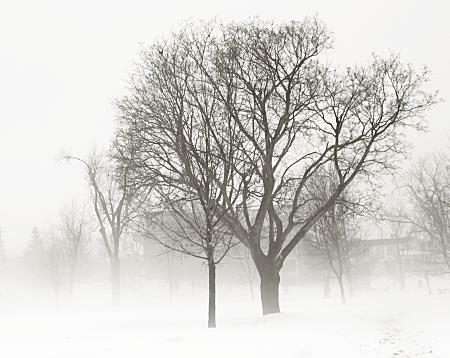
photo - mw
_______________________
Winter is good - his Hoar Delights
Italic flavor yield
To Intellects inebriate
With Summer, or the World -
Generic as a Quarry
And hearty - as a Rose -
Invited with Asperity
But welcome when he goes
-
Emily Dickinson
_______________________
"That is how I have come to think about poetry—that a poem isn't
a problem to solve, but rather it's a singular animal call that
contains multiple layers of both mystery and joy."
Mystery & Birds: 5 Ways to Practice PoetryAda Limón 5) Practice gratitude. Cherish those friends and colleagues who care enough to read and comment on your work. If you truly pursue writing, you will come to realize how enormously important these people are to your writing life and therefore to your making of a "real" life. Make sure you read their work with the same care and closeness they offer you. And buy them coffee and cakes when they return a manuscript with pencil marks on every page. It is a true act of kindness that should be greeted with great gratitude. And be thankful that you want to write at all, what a powerful art to devote a life to, how lucky we are to love such a wild untamable thing....(more)
via mirabile dictu
_______________________
An Interview with Anselm Berrigan
MiPOesias Magazine
A couple years ago I was talking at Bard College about a poem of mine called “Trained Meat”, an eight-page poem written in the fall of 2001, and I described its composition as absorbing the force-fed public language of the War on Terror and puking it back. David Levi-Strauss was there and he asked if all language wasn’t public language, which led into a pretty intense conversation. I know you’re asking about discourses and I’m talking about language, but that’s where I end up when I see the terms “public and private discourses.” Writing “Zero Star Hotel” after Doug Oliver died got me to a place where I could manage personal and public content within a single (longer) work, and I’ve been dealing with variations on that ever since, though the tracking of consciousness in my writing doesn’t have as much description of action on the surface as it has in the past, I think. Right now I wonder if private and public discourses aren’t the same thing, once the work is out and about....(more)
_______________________
The Event in Deleuze
Alain Badiou
translated by Jon Roffe
Like all philosophers of vital continuity, Deleuze cannot abide any division between sense, the transcendental law of appearance, and truths, eternal exceptions. He even seems sometimes to identify the two. He once wrote to me that he 'felt no need for the category of truth. He was certainly justified in such a claim: sense is a name sufficient for truth. There are, however, perverse effects of this identification. Vitalist logic, which submits the actualisation of multiplicities to the order of the virtual One-All, overlooks the fact that, in the simultaneous declaration that events are sense, and that they have, as Deleuze proclaims, 'an eternal truth,' we find religion in its pure state. If sense has in effect an eternal truth, then God exists, having never been anything other than the truth of sense. Deleuze's idea of the event would have had to convince him to follow Spinoza to the end, he who Deleuze elects as 'the Christ of philosophers,' and convince him to name 'God' the unique Event in which becomings are diffracted. Lacan knew well that to deliver that which happens over to sense is to work towards the subjective consolidation of religion, since, as he wrote, 'the stability of religion is provided by sense, which is always religious.'
This latent religiosity is all too apparent in the disciples eager to praise the supposed inverse and constituant moment of an unbridled Capital, the 'creativity' of the multitudes: those who believe they have seen-or what they call seeing-a planetary Parousia of a communism of 'forms of life' in the anti-globalisation demonstrations in Seattle or Genoa, in which disaffected (désoeuvrée) youths participate in their own way in the sinister meetings of the financial establishment. Deleuze, often sceptical towards the formulations of those concerned with political matters, would have, I believe, laughed to himself about such pathos. Having openly conceptualised the place of the event in the multiform procedures of thought, Deleuze had to reduce this place to what he called 'the ideal singularities which communicate in a single and same Event.' If 'singularity' is inevitable, the other terms are of dubious value. 'Ideal' could be taken as 'eternal' if Deleuze was not overly obsessed with the real of the event. 'Communicate' could be taken as 'universal' if Deleuze did not interdict any interruption of communication which would immediately connect any rupture to transcendental continuity. Of the 'single and same,' I have already noted its unfortunate nature: the effect of a One, on bodies, of an evental blow (frappe) is necessarily transformed by the absorption of the event by the One of life....(more)
_______________________
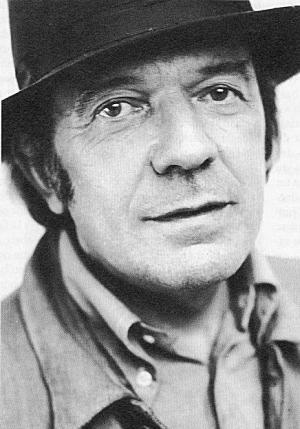
Gilles Deleuze
January 18, 1925 - November 4, 1995
Dialogues
Gilles Deleuze with Claire Parnet
Translated by Hugh Tomlinson, Barbara Habberjam, and Eliot Albert
Contents
Preface to the English Edition Gilles Deleuze
Translators' Introduction
1. A Conversation: What Is It? What Is It For?
2. On the Superiority of Anglo-American Literature
3. Dead Psychoanalysis: Analyse
4. Many Politics
5. The Actual and the Virtual, by translated by Eliot Ross Albert
6. Pericles and Verdi: The Philosophy of François Châtelet, by Translated by Joseph Hughes
Notes
Index
mediafire pdf
via Fark Yaralari = Scars of Différance
_______________________
A Thousand Plateaus
capitalism and schizophrenia
Deleuze Guattari
Translation by Brian Massumi
searchable OCRed pdf
Rhizomatic Bodies:
Thinking through the Virtualities of Control Societies
David V. Ruffolo
When thinking about the production of bodies through neoliberal capitalism and globalization, we begin to see how bodies are increasingly becoming less confined to specific spaces and are instead becoming progressively mobile. It is becoming more difficult to think about bodies as fixed and stable wholes that can be accounted for through disciplinary technologies that are accounted for through representations and significations. In this paper, I argue that these disciplinary accounts are limiting and unproductive considering the contemporary control mechanisms inherent to neoliberal capitalism and globalization. I am therefore interested in exposing and examining the new ways in which bodies are produced and negotiated in relation to the important shift from Foucauldian disciplinary societies that individualize bodies to Deleuzian control societies that dividualize bodies. I will explore these dividualizations by focusing on the rhizomatics of knowledge societies and specifically biotechnologies in order to account for the creative ways in which bodies are produced through the virtualities of control mechanisms. In what follows, I argue that the virtualities of contemporary neoliberal capitalism and globalization foster new bodily productions that are not limited by the past but are instead directed towards the future....(more)
rhizomes.17 winter 2008
Deleuze and Guattari Web Resources
Charles J. Stivale
Difference and Repetition
Gilles Deleuze
google books
The Time Image
Gilles Deleuze
google books
Spinoza, Practical Philosophy
Gilles Deleuze
google books
Foucault
Gilles Deleuze
google books
What is Philosophy?
Gilles Deleuze, Felix Guattari, Hugh Tomlinson, Graham Birchill
google books
Nietzsche and Philosophy
Gilles Deleuze
google books
The Logic of Sense
Gilles Deleuze
google books
_______________________

the little Tay
Perth, ON
photo - mw
_______________________
True Enough
Ray Davis reads The Social Misconstruction of Reality by Richard F. Hamilton
pseudopodium
I grant that an abstract argument founded on a false premise, although possibly charming in other ways, won’t advance the great Sherman’s March of scientific knowledge. But the equivalence of citations with logical premises is itself an assumption in need of examination.
As empirical ice-breaker, I took the top hundred returns from a Project MUSE search for “Foucault” and “Discipline and Punish,” along with a dozen or so Google Book results and a few examples from my general reading over the past few months. In that sample I noticed only one argument which would have been invalidated by refuting Foucault. The vast majority of citations either occurred in studies of Foucault himself (a filter which would catch Hamilton as well) or were… well, here are some examples: ...(more)
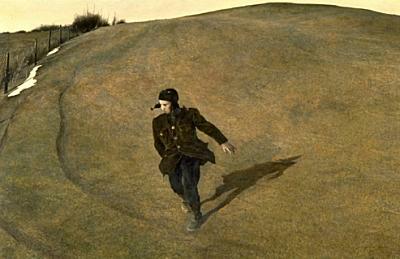
Winter
1946
Andrew Wyeth
July 12, 1917 – January 16, 2009
_______________________
Yes and No
Laura Riding
Across a continent imaginary
Because it cannot be discovered now
Upon this fully apprehended planet--
No more applicants considered,
Alas, alas--
Ran an animal unzoological,
Without a fate, without a fact,
Its private history intact
Against the travesty
Of an anatomy.
Not visible not invisible,
Removed by dayless night,
Did it ever fly its ground
Out of fancy into light,
Into space to replace
Its unwritable decease?
Ah, the minutes twinkle in and out
And in and out come and go
One by one, none by none,
What we know, what we don't know.

Laura (Riding) Jackson
(January 16, 1901 – September 2, 1991)
The Failure of Poetry, the Promise of Language
Laura (Riding) Jackson
google books
Anarchism is Not Enough
Laura Riding
google books
"Celebration of Failure":
The Influence of Laura Riding on John Ashbery
Philip Rowland
flashpoint
_______________________
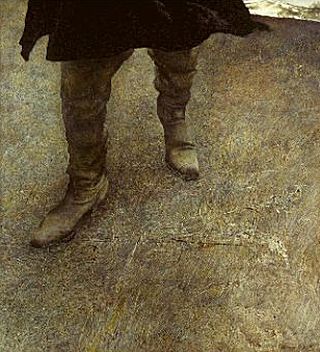 Trodden Weed
Andrew Wyeth
_______________________
The Evangelical-Capitalist Resonance Machine
William E. Connolly
Political Theory 33.6 (2005): 869-886.
mediafire download
The alliance in the United States today between cowboy capitalism and evangelical Christianity cannot be understood sufficiently through the categories of efficient causality or ideological analysis. The constituencies fold similar spiritual dispositions into somewhat different ideologies and creeds. Each party then amplifies these dispositions in the other through the media politics of resonance. The ethos infusing the resonance machine is expressed without being articulated. The inability to grasp this political economy separate fromthe spiritualities infusing it may carry implications for the form a successful countermovement could assume. _______________________
The Map of Places
Laura Riding Jackson
The map of places.
The reality of paper tears.
Land and water where they are
Are only where they were
When words read here and here
Before ships happened there.
Now on naked names feet stand,
No geographies in the hand,
And paper reads anciently,
And ships at sea
Turn round and round.
All is known, all is found.
Death meets itself everywhere.
Holes in maps look through to nowhere.
_______________________
Laura Riding to the World:
"What shall we do?"
fence
Let us first consider who "we" are—we, the inside people. First of all, we are the women. Women are those of us who are most characteristically, most natively, "inside" people. Our responsibility down the centuries has been the order of things inside the houses: the intricate well-being of personal life, its formation and maintenance. And with us, on the inside of things, we have had the poets and the painters and all those men who have been able to treat the outer mechanism of life as subsidiary to its inner realities—who have discovered the inside importance.(...)
A confused outer brutality envelops the inner hearth of life where we cultivate all that we know to be precious and true. We on the inside are not afraid, but we are unhappy: who dares to deny it? The danger is not to ourselves, but to the outside people. We are unhappy on their behalf, however happy on our own. They, these exclusively male-minded beings (with no small number of denatured women in their ranks), are somehow our responsibility. What are we going to do about them?...(more)
_______________________
Rational Meaning:
A New Foundation for the Definition of Words and Supplementary Essays
Laura (Riding) Jackson and Schuyler Jackson
google books
Riding's reason:
An introduction to Laura (Riding) Jackson and Schuyler Jackson, Rational Meaning: Toward a New Foundation of Words
Charles Bernstein
... this is a "poet's work" because the genre of the book is that of a treatise on the philosophy of language. At another level, however, the book is an ars poetica-a "creative" work rather than a work of linguistics, philosophy, or literary criticism as they are professionally practiced. Indeed, the authors intentionally reject, across the board, the major developments in all these professional fields. Nonetheless, Rational Meaning is hardly a defense of poetry in poetic prose, even as it sits in an anxious historical line with treatises and prophetic books by a number or earlier poets, from Sidney to Blake to Coleridge to Shelley to Poe. For this book presents a "rational" approach to meaning that is opposed to poetic approaches to meaning; in this sense it is not an ars poetica but an anti-poetics.
Yet in its testing of our senses of meaning, in its insistence on "language as the ground of human intelligence", Rational Meaning is a pursuit of poetry's love for language by other means; because, for the authors, the means of poetry delude. In this sense, its company might uneasily include other, more contemporary if stylistically dissimilar, works: Louis Zukofsky's Bottom: On Shakespeare (which in its utopian impulse it most closely resembles), Ludwig Wittgenstein's Tractatus Logico-Philosophicus, Walter Benjamin's "Doctrine of the Similar," Ezra Pound's Guide to Kulchur and Jeff ferson and/or Mussolini, William Carlos Williams's The Embodiment of Knowledge, Simone Weil's The Veed for Roots, and Gertrude Stein's How to Write. In making these comparisons, so against the grain of a work that insists that its contribution is precisely its noncomparability, I realize I am aestheticizing and historicizing this work in ways rejected by the authors. ...(more)
_______________________
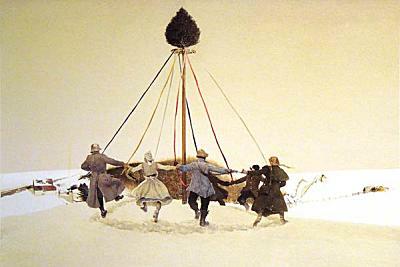 Andrew Wyeth
_______________________
Unread Pages
Laura Riding
An end is a happy end only:
What only was moves into what is,
Unbodied grows, but lasting.
And the matter is now alive,
Even by this beneficence of Yes
To No and No like angels made of nothing.
Science, the white heart of strangers,
Bleeds with an immaculate grief -
Impatient brotherhood,
Tired apostates of curiosity,
Creed if apostatizing.
Truth need be but dead afterworld
To those who've had enough,
The readers and the lookers-on -
As stars keep off, or to short minds
Night seems a less real time than day,
Not to be measured with or counted to
That quick self-evident sum of sun.
Have sleep and midnight warmth,
Where your scant eyes see failure,
Numbering the wakefullest page
The dark and frosty last.
An end is a happy end only.
And first the book's end comes,
The printed public leaves off reading.
Then open the small secret doors,
When none's there to read awrong.
Out runs happiness in a crowd,
The saving words and hours
That come too tragic-late for souls
Gifted with their own mercy:
Who spare themselves the joys
That would have darkened them
From the predaceous years.
Too orthodox maturity
For such heresy of child-remaining -
On these the dusty blight of books descends,
Weird, pundit babyhoods
Whose blinking vision stammers out the past
Like a big-lettered foetus-future. The Poems of Laura Riding
Persea Books
|

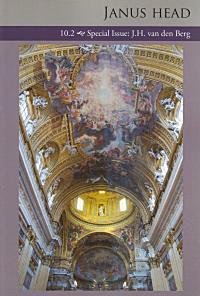 Janus Head
Janus Head
 The Age of Briggs & Stratton
The Age of Briggs & Stratton























































